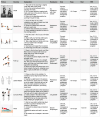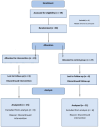Evaluating the Effects of an Enhanced Strength Training Program in Remote Cardiological Rehabilitation: A Shift from Aerobic Dominance-A Pilot Randomized Controlled Trial
- PMID: 38592308
- PMCID: PMC10934934
- DOI: 10.3390/jcm13051445
Evaluating the Effects of an Enhanced Strength Training Program in Remote Cardiological Rehabilitation: A Shift from Aerobic Dominance-A Pilot Randomized Controlled Trial
Abstract
(1) Background: Cardiac rehabilitation often emphasizes aerobic capacity while overlooking the importance of muscle strength. This study evaluated the impact of an enhanced remote strength training program (RCR-ST) on cardiac rehabilitation. (2) Methods: In this randomized prospective study (RCT registration number SMC-9080-22), 50 patients starting cardiac rehabilitation were assessed for muscle strength, aerobic capacity, and self-reported outcomes at baseline and after 16 weeks. Participants were divided into two groups: the RCR-ST group received a targeted resistance training program via a mobile app and smartwatch, while the control group received standard care with general resistance training advice. (3) Results: The RCR-ST group demonstrated significant improvements in muscle endurance, notably in leg extension and chest press exercises, with increases of 92% compared to 25% and 92% compared to 13% in the control group, respectively. Functional assessments (5-STS and TUG tests) also showed marked improvements in agility, coordination, and balance. Both groups improved in cardiorespiratory fitness, similarly. The RCR-ST group reported enhanced physical health and showed increased engagement, as evidenced by more frequent use of the mobile app and longer participation in the rehabilitation program (p < 0.05). (4) Conclusions: Incorporating a focused strength training regimen in remote cardiac rehabilitation significantly improves muscle endurance and patient engagement. The RCR-ST program presents a promising approach for optimizing patient outcomes by addressing a crucial gap in traditional rehabilitation protocols that primarily focus on aerobic training.
Keywords: cardiac rehabilitation; muscle endurance; patient engagement; remote health monitoring; resistance training.
Conflict of interest statement
The authors declare no conflicts of interest.
Figures





Similar articles
-
Erratum.Mult Scler. 2016 Oct;22(12):NP9-NP11. doi: 10.1177/1352458515585718. Epub 2015 Jun 3. Mult Scler. 2016. PMID: 26041800
-
Cardiac Rehabilitation and Complementary Physical Training in Elderly Patients after Acute Coronary Syndrome: A Pilot Study.Medicina (Kaunas). 2021 May 25;57(6):529. doi: 10.3390/medicina57060529. Medicina (Kaunas). 2021. PMID: 34070257 Free PMC article. Clinical Trial.
-
Multimodal agility-based exercise training (MAT) versus strength and endurance training (SET) to improve multiple sclerosis-related fatigue and fatigability during inpatient rehabilitation: a randomized controlled pilot and feasibility study [ReFEx].BMC Neurol. 2023 Oct 28;23(1):388. doi: 10.1186/s12883-023-03436-8. BMC Neurol. 2023. PMID: 37898772 Free PMC article. Clinical Trial.
-
The Effects of Dietary Protein Supplementation on Acute Changes in Muscle Protein Synthesis and Longer-Term Changes in Muscle Mass, Strength, and Aerobic Capacity in Response to Concurrent Resistance and Endurance Exercise in Healthy Adults: A Systematic Review.Sports Med. 2022 Jun;52(6):1295-1328. doi: 10.1007/s40279-021-01620-9. Epub 2022 Feb 3. Sports Med. 2022. PMID: 35113389
-
Recommendations for resistance exercise in cardiac rehabilitation. Recommendations of the German Federation for Cardiovascular Prevention and Rehabilitation.Eur J Cardiovasc Prev Rehabil. 2004 Aug;11(4):352-61. doi: 10.1097/01.hjr.0000137692.36013.27. Eur J Cardiovasc Prev Rehabil. 2004. PMID: 15292771 Review.
Cited by
-
Half Squat Mechanical Analysis Based on PBT Framework.Bioengineering (Basel). 2025 Jun 1;12(6):603. doi: 10.3390/bioengineering12060603. Bioengineering (Basel). 2025. PMID: 40564419 Free PMC article.
References
-
- Taylor R.S., Dalal H.M., McDonagh S.T.J. The role of cardiac rehabilitation in improving cardiovascular outcomes. [(accessed on 27 December 2023)];Nat. Rev. Cardiol. 2021 19:180–194. doi: 10.1038/s41569-021-00611-7. Available online: https://www.ncbi.nlm.nih.gov/pmc/articles/PMC8445013/ - DOI - PMC - PubMed
-
- Hilu R., Haskiah F., Khaskia A., Assali A., Baron I., Gabarin M., Chen J., Pereg D. Effectiveness and Safety of Remote Cardiac Rehabilitation for Patients After Acute Coronary Syndrome. [(accessed on 27 December 2023)];Am. J. Cardiol. 2023 207:54–58. doi: 10.1016/j.amjcard.2023.08.168. Available online: https://www.sciencedirect.com/science/article/pii/S0002914923009487. - DOI - PubMed
-
- Giggins O.M., Doyle J., Smith S., Vavasour G., Moran O., Gavin S., Sojan N., Boyle G. Remotely Delivered Cardiac Rehabilitation Exercise for Coronary Heart Disease: Nonrandomized Feasibility Study. [(accessed on 27 December 2023)];JMIR Cardio. 2023 7:e40283. doi: 10.2196/40283. Available online: https://www.ncbi.nlm.nih.gov/pmc/articles/PMC9960022/ - DOI - PMC - PubMed
LinkOut - more resources
Full Text Sources
Miscellaneous

